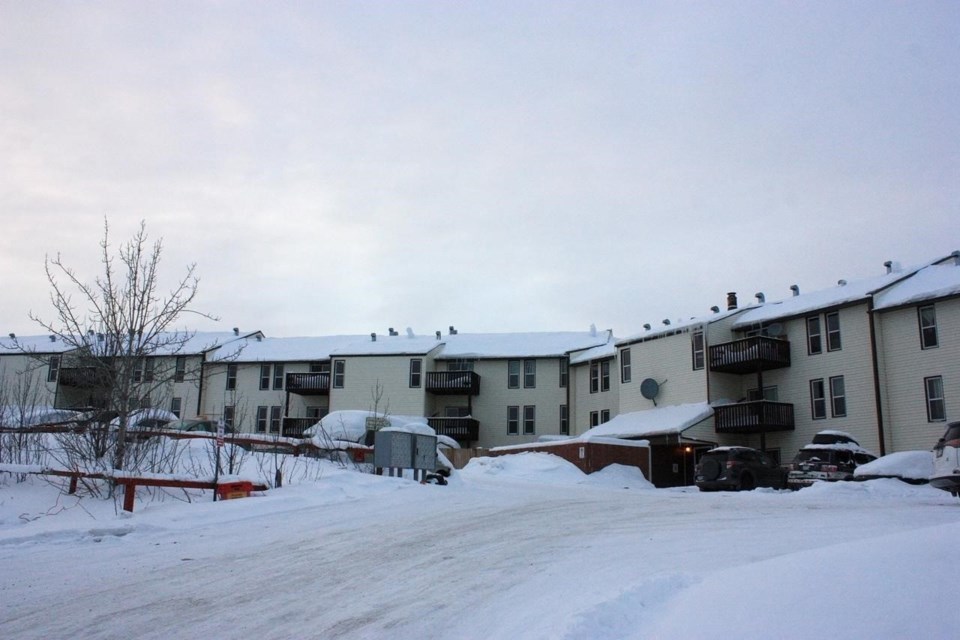YELLOWKNIFE — Two national housing groups are calling on the Northwest Territories to declare a state of emergency for housing Indigenous people, particularly women and girls.
The National Indigenous Housing Network and Women's National Housing and Homeless Network say Housing N.W.T., the territory's housing agency, is failing northern Indigenous people.
"We're literally in a housing state of emergency," housing advocate Lisa Thurber said on behalf of the groups.
She said she can't move clients into hotels in Yellowknife because there are no rooms available.
"These tenants are literally in tears," she said. "The biggest complaint is: 'I'm cold.' We live in the Northwest Territories for Pete's sake and most of the winter is cold. So what are we doing about that?"
Thurber, who recently formed a territorial tenants' association, said housing issues in the N.W.T. have been well documented.
Richard Edjericon, a member of the territory's legislative assembly, tabled photos in October depicting an insect infestation in a public housing unit in the Lanky Court apartment building in Yellowknife.
Last month, several other legislature members also raised concerns with public housing citing issues such as mould, pest-infestations, leaking sewage, broken windows, inadequate heating, high rental costs and arrears.
"The root of the problem is this government's inability or unwillingness to provide adequate housing for all our residents," Kevin O'Reilly told the assembly. "Housing is not a priority with this government when we continue to spend more on roads than on housing and travel to Ottawa for mega projects over housing."
Legislature member Caitlin Cleveland subsequently raised concerns that Housing N.W.T. doesn't collect data on the gender or ethnicity of people living in public housing or on people experiencing homelessness across the territory.
Beyond public housing, the 2021 census found just over 13 per cent of N.W.T. households were in need of core housing, meaning their dwellings did not meet at least one of adequacy, affordability or suitability standards. Yellowknife's latest point-in-time homeless account said 312 people experienced homelessness in the city in 2021.
Housing N.W.T., in partnership with local housing and community organizations, is responsible for more than 2,400 public housing units across the territory. It also offers a range of public and market housing programs and services, including a rent subsidy, homelessness assistance funding and a home-purchasing program.
The two housing networks are demanding Housing N.W.T. release control over housing units and that a group of Indigenous advisers from across the territory oversee its decisions.
They are also calling for the dissolution of the housing corporation, saying Indigenous governments and organizations are best placed to address the territory's housing crisis.
"We have a plan. We're not just calling the state of emergency to say 'do something,'" Thurber said, adding the plan includes purchasing 70 off-grid homes to support those most in need.
"We're hoping to see more housing," she said. "I want to see a convoy of trucks bringing in this housing."
Several Indigenous groups in the territory are already working to take over control of housing.
The Dene Nation passed a resolution to do so in 2019, saying the Crown had not met its obligations to provide quality housing for its citizens. In May 2022, the federal government said it would provide $600,000 over three years to the Dene Nation to create a housing and infrastructure secretariat and $135,000 to purchase a modular unit in K'átl'odeeche First Nation.
Also in 2019, the Yellowknives Dene First Nation announced a plan to create a community-driven housing strategy with the aim of controlling housing in Dettah and N'Dilo.
In Fort Good Hope, the K'asho Got'ine Housing Society took over control of housing maintenance and repair from the N.W.T. housing corporation in 2020.
Paulie Chinna, the minister responsible for the territory's housing corporation, said in a statement that a state of emergency is usually declared during a natural disaster, civil unrest, armed conflict or medical pandemic so the government can put through policies it normally would not be permitted to do.
Housing N.W.T. is addressing the territory's housing crisis by making policy and program changes, and working with community and Indigenous governments, Chinna said.
"Meeting the territory’s housing needs is bigger than any single government or organization, and the (government of the Northwest Territories) will continue to work in partnership with Indigenous governments, Indigenous organizations, the government of Canada, community governments and other stakeholders to achieve the territory’s housing goals."
Chinna said Housing N.W.T. is in the process of advancing a multi-year capital plan, which includes delivering 510 housing units. The agency's latest annual report also states it has been able to undertake the largest expansion of public housing units in two decades, thanks largely to a partnership between the territorial and federal governments.
This report by The Canadian Press was first published March 9, 2023.
___
This story was produced with the financial assistance of the Meta and Canadian Press News Fellowship.
Emily Blake, The Canadian Press




